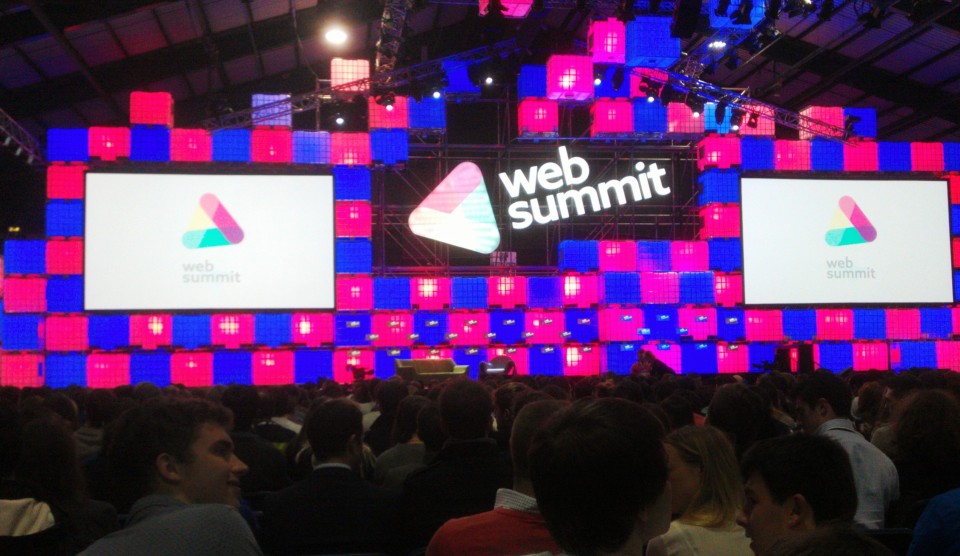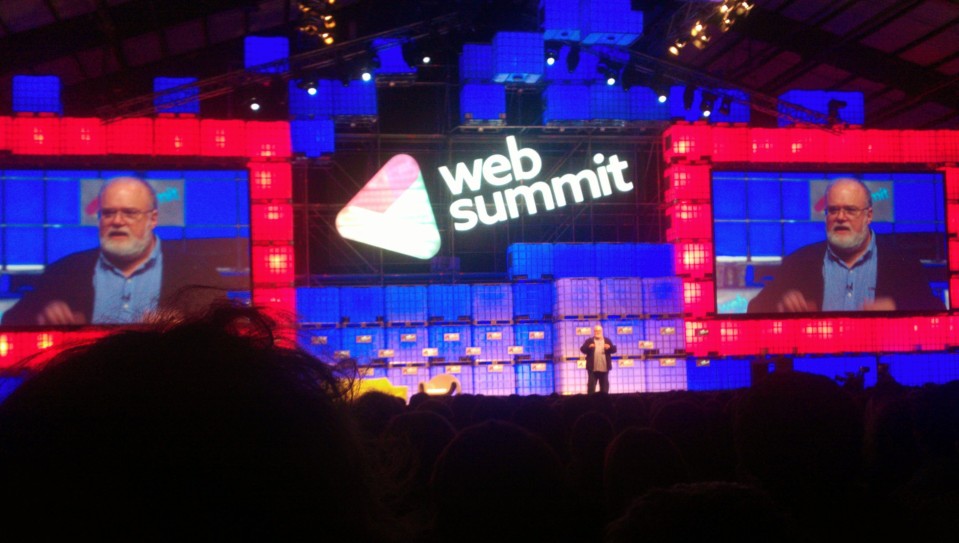Self-driving taxis and trucks will become the norm within twenty years. Self-driving cars will follow not long after. Huge swathes of jobs will disappear. And the development of true artificial intelligence poses an existential threat to humanity. These were the biggest predictions about the future of tech to come out of last November’s Student Web Summit.

Delighted to have got hold of a free ticket to one of the biggest tech conferences in Europe, I sat in the slightly surreal glow of hundreds of colourful plastic cubes to find out what all the fuss was about.
[gigya src=”https://abfiles.s3.amazonaws.com/swf/audioboom_default_player_v1.swf” style=”background-color:transparent; display:block; min-width:300px; max-width:700px;” flashvars=”image_option=small&imgURL=https%3A%2F%2Fd15mj6e6qmt1na.cloudfront.net%2Fi%2F12905372%2F300x300%2Fc&link_color=%2358d1eb&mp3Author=Shadician&mp3Duration=20000.0&mp3LinkURL=https%3A%2F%2Faudioboom.com%2Fboos%2F2883320-student-web-summit-2014-intro&mp3Time=12.33pm+11+Feb+2015&mp3Title=Student+Web+Summit+2014+-+intro&mp3URL=https%3A%2F%2Faudioboom.com%2Fboos%2F2883320-student-web-summit-2014-intro.mp3%3Fsource%3Dwordpress&player_theme=light&rootID=boo_player_1&show_title=true&waveimgURL=https%3A%2F%2Fd15mj6e6qmt1na.cloudfront.net%2Fi%2Fw%2F1937345″ width=”480″ height=”150″ allowFullScreen=”true” wmode=”transparent”]
These are my top three speakers from Web Summit’s student event:
David McWilliams, the economist who predicted Ireland’s property crash
“The Irish education system creates an environment where lots of people leave college thinking they’re stupid,” he begins “university still teaches us to be conventional.”

It turns out being conventional can get you into a lot of trouble as when, at the height of the Irish economic boom, “a syndicate of dentists outbid the builders” and a piece of land in Cork sold for a ridiculous 6.5 million Euro. Shortly after, the Irish property bubble burst.
The conclusion David draws is that: “Conventional thinking is never superseded by a better idea, it is always superseded by events…in the words of Mike Tyson: Everybody has a plan until they’re punched in the face.”
“Even the best made idea doesn’t survive the impact with the real world.” The solution? Flexibility: David points out his entire career is made up of jobs that didn’t exist when he started and new technology is accelerating this trend. Be flexible and be creative. According to him, creative people (artists, entrepreneurs) are above all non-conventional and will do what they love. His parting advice: “Figure out what you love and do that for a crust.”
Brad Templeton, world expert on transportation automation
“Cars and automation is bigger than the internet.” Brad stands still as his hands emphasise the importance of his opening statement. The technology, he says, is almost there: Google is already a leader in self-driving car technology and all of the major car companies are well on the road to having self-driving vehicles ready by 2020. But why the big fuss?
Nearly 1.3 million people are killed in car accidents each year. Automated cars would prevent the vast majority of these. Brad says the cost of accidents in the USA is 0.13 Euro per kilometer, which is more than the cost of petrol. Meanwhile over half our land, a quarter of our energy and a quarter of our greenhouse gas emissions are down to cars.
Self-driving cars recharging, refueling and parking themselves will mean a huge reduction in parking spaces needed, resulting in a “tremendous bonanza of land” and reduced congestion. In the USA alone self-driving cars are estimated to reduce C02 emissions by 200 million tonnes and reduce reliance on imported fuel.
But self-driving cars are also set to change much more about the way we think about travel: “Imagine mobility on demand.” People will be able to ask “What car do I need today?” instead of “What car do I need for my life?”. Brad says today’s taxi-hailing apps such as Hailo and Uber are just the beginning of what’s possible. With no drivers, cars can be reconfigured to include desks and face-to-face seating.
Americans currently spend 50 billion hours per year behind the wheel, compared to 249 billion hours working. Freeing up those 50 billion hours of time will be a seismic shift.
Since this talk one of Brad’s predictions has already come true: we’ll be able to directly update our cars’ software far more easily (and more frequently) than replacing entire vehicles. Tesla did this last month: pushing a wireless update out to car owners overnight and actually increasing their vehicles’ speed.
Gary Marcus, professor of cognitive science and artificial intelligence expert
Gary Marcus steps onto the stage. Clad mostly in black, he moves purposefully and speaks softly, his colourful scarf swaying as he paints a picture of what a world with true artificial intelligence will look like.
He describes a future scenario where artificial intelligence could orchestrate perfect global energy and food supply management, produce new medicine and make countless new scientific discoveries. Currently we produce more scientific papers than anyone can read, let alone effectively analyse. Artificial intelligence would allow us to find the scientific breakthroughs hiding in our research haystacks.
But such an intelligence would also be a powerful force which is neither moral nor immoral. The danger is, in a similar fashion to nuclear energy, it would do as it we program it to: “An all-powerful computer that was programmed to maximize human pleasure, for example, might consign us all to an intravenous dopamine drip; an automated car that aimed to minimize harm would never leave the driveway.”
Another problem is that as machines get smarter they will inevitably take away more and more of our jobs. Taxi and truck drivers will be replaced by self-driving vehicles in the next twenty years, what will happen when the majority of jobs are done by robots?
Gary assures us we are not threatened by artificial intelligence in the next ten years, but poses the question: “How can we make sure we’re safe in 100 years?”. According to Gary, there simply aren’t enough people discussing this point at the moment.
Recent films such as Her and Ex Machina, not to mention warnings from Elon Musk, Stephen Hawking and Bill Gates, have pushed the artificial intelligence debate further into the mainstream since Gary’s talk. It ended with an appeal to the audience to seriously consider getting involved in developing artificial intelligence ethics. It’s worth reading his article on machine morality over at the New Yorker.
Bonus
As this was a student event many of the speakers also shared their career advice. Here are two of my favourite quotes:
“Show people your skills, go out there and experience as much as possible. Find what gets you out of bed every day.” – Riley Ennis, CEO of Immudicon (and no BA degree)
“Surround yourself with people who push and inspire your growth. Put yourself in situations where you do things you’re not really ready for.” – Andrew W. “Drew” Houston, founder & CEO of Dropbox





